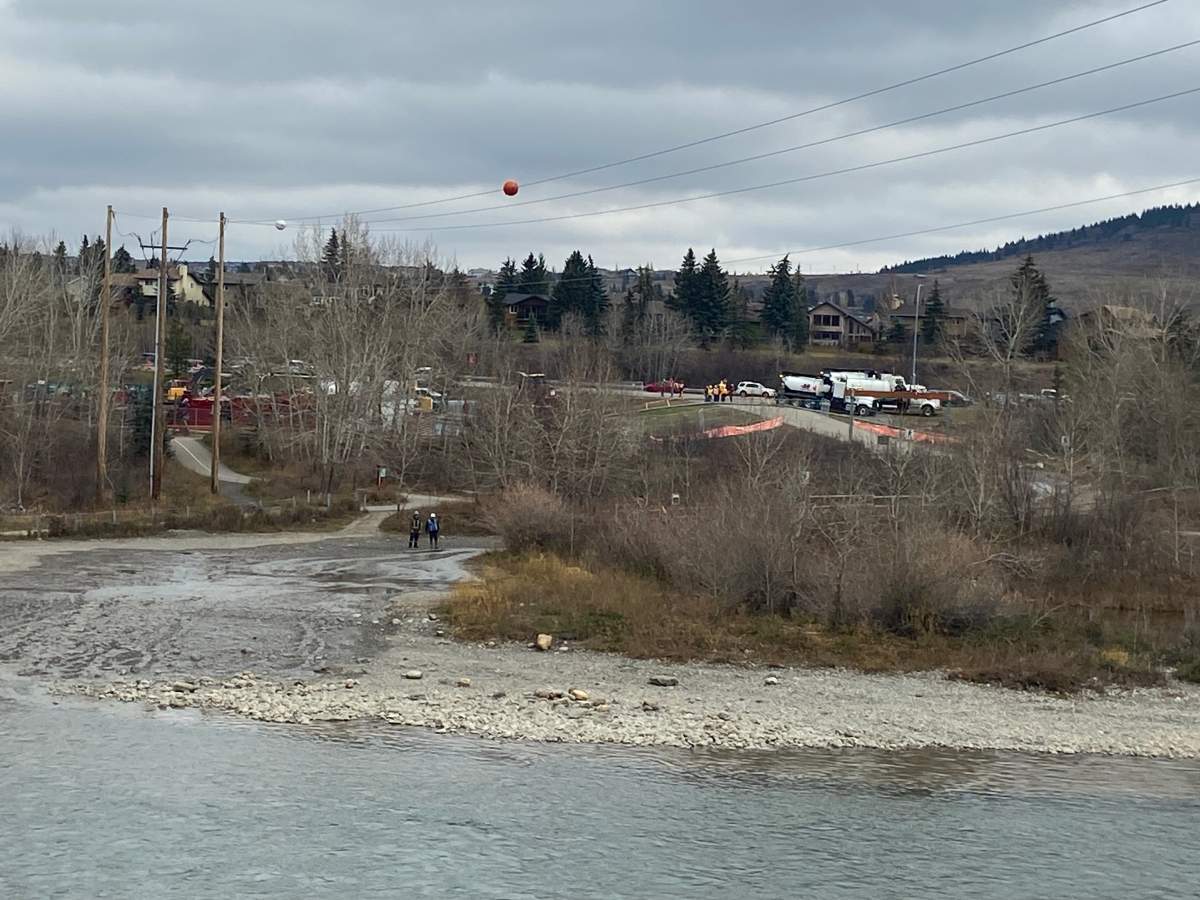Cochrane, Alta., municipal officials are saying the sewage and water line breaks that started on Saturday evening have significantly impacted the town’s water reservoir levels.

The town issued an emergency alert on Saturday evening after a sewage main break at around 6 p.m.
Cochrane Mayor Jeff Genung told Global News on Sunday the seepage was caused by a rupture to one of the town’s wastewater pipelines. Crews were upgrading the line as part of a regular-schedule capital project on Griffin Road when the drill hit one of the pipelines.
Town officials said the water was, and remains, safe to drink. The emergency alert was later cancelled at around 11:50 p.m.
In an update on Facebook at around 11:45 a.m. on Monday, the Town of Cochrane said it is focused on stopping sewage flow to the Bow River. A major hauling operation was underway to help stabilize water reservoirs and maintain water levels, the town said.
All residents and local businesses were asked to reduce water consumption following level three water restrictions issued on Sunday. The town also said it had to temporarily restrict water to some local businesses on Monday to complete repairs to the wastewater line. The Spray Lake Sawmills Centre was also asked to close temporarily.
Multiple pathways adjacent to the Bow River in Cochrane remain closed as of 11:45 a.m. on Monday. These include:

Get daily National news
- Jim Uffelmann Memorial Park
- Paths directly adjacent to and below the Highway 22 bridge
- Pedestrian walkway on the Highway 22 bridge
Mike Derricott, Cochrane’s chief administrative officer, said crews did not see any flow into the Bow River as of 2 p.m. on Monday.
“We remain focused on the continued provision of safe drinking water and implementing all efforts to maintain water levels,” said Derricott at a news conference on Monday.
“Our water reservoirs, which we use to provide safe drinking waters to residents and maintain fire suppression capabilities, are at critical levels … We are working to bring in water from additional sources to stabilize the situation.
“This is a complex and quickly evolving situation and we appreciate your cooperation as we continue to respond.”
Derricott added the town is not prepared to give an accurate number of how much water has been lost.
Ryan Fournier, press secretary to Alberta Environment Minister Rebecca Schulz, said Environment and Protected Areas are working with the Town of Cochrane, City of Calgary, Alberta Health Services and others to provide support when needed.
EPA staff are currently on the ground in Cochrane monitoring the situation but no direct support has been required, Fournier said.
“Our top priority is ensuring drinking water remains safe,” Fournier told Global News in an emailed statement.
“There are no concerns about drinking water safety at this time.”
Kaila Langran of the City of Calgary said a water services response team is carefully monitoring the sewage seepage and working closely with the Town of Cochrane.
City staff are conducting extra water quality sampling of the Bow River and Calgary’s water remains safe to drink as of Monday.
“Given the water is safe based on laboratory analysis, re-distributing through the system is not needed,” Langran said in an emailed statement.
Silvia Damelio, chief executive officer and fisheries biologist of Trout Unlimited, said the sewage line break poses a risk to the health and welfare of animals and fish in the Bow River. However, she said it is hard to tell how they will be impacted at this time.
Trout Unlimited also had to cancel a survey
“The fisheries in the Bow River are already impacted by a number of factors, not limited to climate change even though it is a big overreaching factor,” she told Global News.
“The competition for use of water within the Bow River watershed also leads to variable water levels. We have extremely low water right now, which can be challenging for the fish.
“We don’t know if the spill impacted the health and well-being of anyone in the area, but you want to be cautious … It could be a number of things. There could be toxins. There could be parasites. One of the great concerns that we do have is medicinal products, which can greatly impact fish.”








Comments